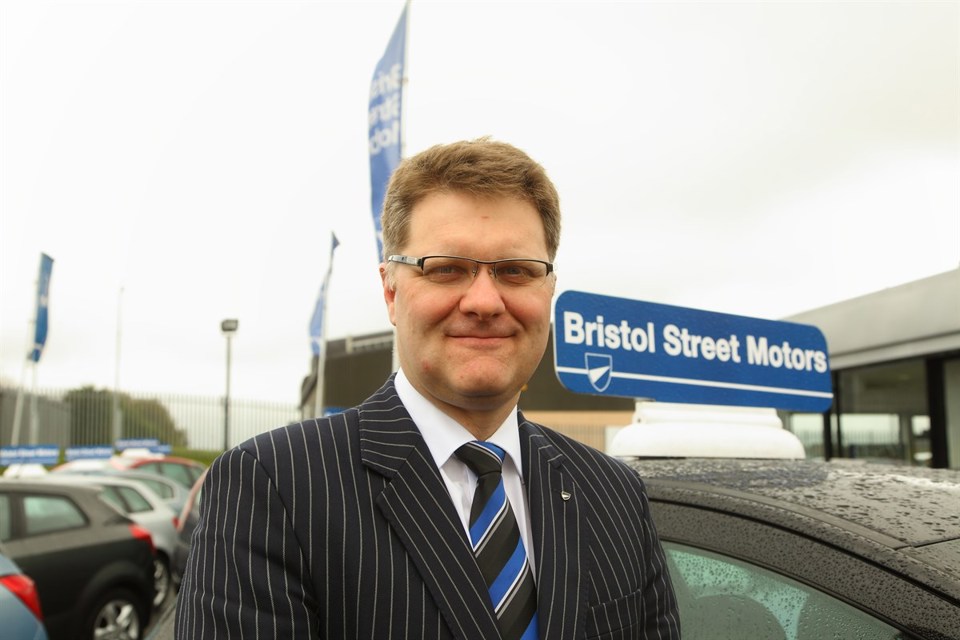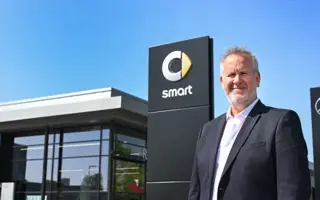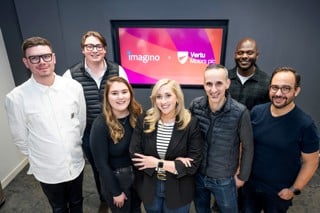In 2006, Vertu Motors was started by Robert Forrester with the aim to acquire and consolidate motor retail companies. Today, those aims remain unchanged and its managing director sees no reason to stop growing the company and the brands it represents, with the Germans firmly in the expansion plan.
The strategy
Jeremy Bennett: You started Vertu to acquire and consolidate. Why those two aims?
In 2006, Vertu Motors was started by Robert Forrester with the aim to acquire and consolidate motor retail companies. Today, those aims remain unchanged and its managing director sees no reason to stop growing the company and the brands it represents, with the Germans firmly in the expansion plan.
Essential stats
Annual turnover: £1,088.3m (year ended 29th February 2012)
Annual sales volumes (new and used): New retail – 25,400; new fleet – 17,863; total new – 43,263 (year ended 29th February 2012)
Properties (freehold/leasehold): 50:50 split (October 2012)
The strategy
Jeremy Bennett: You started Vertu to acquire and consolidate. Why those two aims?
Robert Forrester: It’s a theoretical idea insofar as one of the subjects I studied quite late at university was marketing economics and I think that capitalist companies have to grow; they can’t stop, they’ve got to grow profits. You can’t stop. Capitalism doesn’t do stop. The longest period of inactivity in this sense for us was nine months and that was quite recently.
JB: You believed at that point you had made as much as you could from what you had?
RF: Absolutely not. I was sure we had management capacity to do more, so the acquired businesses had been integrated and we were on the track to a better performance.
The thing about our business is that you don’t suddenly go from poor to great overnight. It takes four or five years because you’ve got to build the aftersales database and that’s what our strategy does.
If we have management financial capacity then the business will grow. If we don’t – for example, if there’s a downturn in the business – then I think the logical thing to do is to place your management at the front line with your current business rather than expand. We actually slowed down a bit last year, partly because I was concerned about the economy and partly because we’d brought in a lot of businesses that needed to be integrated, but I think growth in profits is the crucial thing.
JB: What about consolidation?
RF: Consolidation is just what happens when you acquire.
JB: Is it good for the sector? Is it good for the customer?
RF: Ultimately, yes. Infrastructure can be put in place in larger groups that enable higher levels of customer relationship and management strategies that can –not always – deliver benefits for the customer.
JB: What sort of benefits? It suggests less choice, less competition, which is surely not a positive?
RF: There will always be competition. There are just four or five players in the UK supermarket sector, but I don’t think anybody is really saying that there isn’t competition.
There is vicious competition so I don’t think you can say big groups means less competition. There’s actually quite significant competition.
The issue is that with scale you can have systems, processes, training programmes etc, that can generate significant benefits. However, it can go into reverse, it’s all predicated on having the right business process and the right people. Buying businesses is actually quite easy, running them is a lot more difficult. You have to have the right people, it doesn’t work if you don’t have the right people.
JB: Can you define a perfect acquisition? What criteria do they fulfil?
RF: There isn’t a perfect acquisition. We apply a financial model over a three to four-year period. The model has changed from 2007 onwards, with the economic climate, in terms of multiples. But it’s about ensuring an appropriate level of cash return in a medium time frame.
JB: How flexible are you on the expectations you have of a newly acquired business?
RF: We can make strategic decisions to expand with a manufacturer or expand a particular location and I might take a slightly longer term view on something. Ordinarily we don’t.
JB: You look for performance improvement, room to grow or improve. There is risk in that.
RF: Yes. We’d work for the public sector if we didn’t want risk wouldn’t we? We look for it in the medium term – three to four years.
JB: Are the risks greater because of the economic climate?
RF: Yes, particularly if you take a broken dealership today compared to five or 10 years ago. One key element of turning around a broken dealership is to sell loads of cars to create an aftersales database that creates aftersales absorption. Now if the new car market is at 1.9 million units rather than 2.5m it’s going to take longer.
JB: Do you look to sell businesses at any point?
RF: No. If we came to the conclusion that something can’t work, I think it reasonably unlikely that anybody would want to buy it. We exited a number of sales outlets earlier this year, because the brand didn’t work, but we have not reduced our locations. Market share is a key influence.
JB: So why not become a solus Ford dealer, knowing its market share leads the field at 12%?
RF: There is a place for the smaller franchises. Take Bristol for example. It’s got Chrysler Jeep. Now this is a pretty speculative franchise, it’s basically been relaunched, but it’s got quite a large aftersales parc and the older cars do need a lot of servicing and when they come in the bills are high.
So actually in terms of sweating the asset in Bristol, you are probably willing to take a speculative risk on that franchise because actually what it’s doing is bringing in thousands of aftersales hours. It’s not a simple translation. Mitsubishi is actually very similar. It’s going through a bad time on sales at the moment, but it’s big lumpy product and therefore a good contributor of aftersales.
JB: How do you know Chrysler Jeep will work in Bristol, but not so somewhere else, say Newcastle?
RF: The big question we have to answer is what is the size of the database and therefore the aftersales opportunity.
JB: Are dealers coming to you wanting to sell, providing you with an unusual acquisition opportunity?
RF: They might be, but we won’t buy more because of it. We will never buy more businesses than we can cope with at one time. And our measure is management bandwidth. So how many acquisitions have I got per division, how much intensive care do the new businesses actually need, what’s the current state of play within the division? It’s a judgement call.
JB: How do you have the management to make this possible?
RF: One reason why we’ve been able to take on so many businesses in such a short time without falling over is because if an individual comes to my attention who I think is capable I will employ them before the role I have in mind for them is actually available. We would probably take them on in advance and then almost find acquisitions to suit them.
This applies across the business – a general manager should know where his two next sales executives are coming from.
JB: When you acquire a business what are the challenges you typically face in bringing it up to the standard you want?
RF: We are quite IT based and, if you’ve worked in a business that’s been very heavily based on paper, that could be a barrier. We run at a fairly heavy pace. We run as a seven-day-a-week business.
Click on the next page for Forrester's view on Vertu's financials.
[page-break]Robert Forrester CV
1990 After completing a geography degree, works as a chartered accountant with Arthur Anderson for nine years. His first job is to audit dealer group Peoples.
1999 Joins a property company as an accountant.
2001 Financial director at Reg Vardy.
2005 Managing director at Reg Vardy.
2006 The company is sold to Pendragon. Forrester leaves Reg Vardy.
December 2006 Vertu Motors floated on the stock exchange with Forrester as managing director.
The financials
JB: Your growth in turnover has been pretty spectacular. It’s doubled in four years. Was that your initial plan?
RF: The original business plan said we’d get to about 65 dealerships at the end of year five. If you look at business locations we probably go to about 68 locations by the end of year five and we’re now five and a half years in and we’ve got 70.
JB: Performance is pretty flat. Statutory profit before tax has been 0.6%, 0.5% and 0.5% in the last three years. Then after non-operational items you can say it declined.
RF: You can look at any company in the 2009/10 period and see a decline, reversed by scrappage, then experienced a downturn, but now seeing some upward movement.
JB: Are your shareholders satisfied with the level of return?
RF: Our shareholders have been supportive throughout. Are we happy with the return on investment? No, clearly not. We’ve spent a lot of money and downsized off to get the return. We’ll continue to do that.
JB: You can still grow and make returns with all the risk that comes with growth?
RF: Yes.
JB: What’s your aspiration in terms of returns? Could you be a 2% business?
RF: We might struggle to be a 2% business if the scale of our fleet operations continues, because fleet operations make a 2% gross margin. So the chance of making a 2% bottom line is slim as fleet is a fundamental part of our business. In the retail side of the business I think the return is certainly between 1-2% per cent. Some of our businesses make six.
JB: Why do they make six?
RF: Strong market share, they have volume franchises, very strong management, strong used car operations and aftersales contribution.
JB: Isn’t it replicable?
RF: It is replicable, but a smaller market share franchise is probably, depending on the size of the overheads, more unlikely to get to that level.
JB: You have no debt. Are you debt averse?
RF: In this economic environment we’re debt cautious. We will by the end of February have some debt as we will continue to grow. We’ve got quite substantial debt facilities.
JB: Your lack of debt has been deliberate?
RF: Absolutely. I remember the moment I decided. August 2008. I went to the CBI economic affairs committee meeting in London and realised the world might come to an end. Until then I hadn’t fully appreciated how serious it was.
JB: What is your feeling about the economy in 2013?
RF: We’ve got a government that’s going to stick to the plans and we’re not going to go bust. Families are in the process of rebuilding their balance sheets. Inflation is coming down and wages are going up a little bit. The fairly significant fall in wages last year knocked the car industry quite substantially last summer. Now, there is more confidence – not a lot of it, but the economy is now a benign environment.
Click on the next page to view Forrester's comments on Vertu's brand portfolio and approach to training.
[page-break]Brand portfolio
JB: Your brand mix mirrors the market share of manufacturers you partner with.
RF: Yes, but it doesn’t mean we only have large market share manufacturers, we will probably have more of them. What we’re trying to do is keep perspective. I’m not really interested in what the market share is today, but what the market share is in five years’ time.
JB: You’re confident you can make that prediction?
RF: No, but you’ve got to try your best. We made a call five years ago as a team that we thought Hyundai would succeed in the UK and so we took on the franchise. If you look at the product coming out of Ford there isn’t a man in the world would bid against the company and there are some fantastic General Motors’ products. So you’ve got to pick your moments haven’t you?
JB: Why did you pick Hyundai and not Kia?
RF: No real reason. It could be part of our business. Kia is a great franchise. Its aftersales absorption is increasing rapidly.
JB: How will your brand portfolio develop?
RF: In the next five years we’d look to have some specialist marque, a premium brand. We’ll work with a German brand in the next five years. We said for the first five we wouldn’t because I wanted to make sure the company was mature enough to be able to do it. I wanted the confidence the business was mature enough in terms of systems and processes to deliver what the specialist marques want.
JB: Are premium brands more profitable?
RF: They’ve got a high return on sales generally, although not always as it will fluctuate. But their investment levels are high. So the question is, do you get a high return on your investment? And it depends on which franchise and at what point
in time.
Training
JB: Another stated aim of the group is to invest more in training per head than any other motor group in the UK. Is this true?
RF: I have no idea because I don’t know what the others spend, but certainly we don’t skimp on training. We are training fanatics.
If we train everybody, it means we can hold everybody accountable. Most people respond very well to training, so we have aftersales training programmes, management training programmes, sales training programmes. And the training budget is increased every year. If we have a bad month, we don’t cut the training spend. It’s a separate cost centre.
JB: What’s more important, classroom or on-the-job training?
RF: On-the-job training is probably more important. The senior team spends a lot of time talking to people, showing them things, not telling them what to do.
We try to learn from our mistakes using our complaints system. Before a complaint gets signed off I get a report outlining the cause, who caused it, what lessons have we learned and is the customer happy. This is a way for our general managers to learn about root cause analysis, and yes we can improve and that goes for every complaint that we get.
JB: If your training budget goes up every year, is the benefit, the return that you get back, definitive?
RF: Some of it isn’t measurable, some of it is. The direct sales training is measurable, so for example we do 60 or 70 mystery shops every month, with video cameras, to measure the sales process – and it entails each area of the business. If you scored below 40% you’re put on a week’s training.
If you score above 90% you get £100, if you get 95% you get £150, above that, you get £250. Our average scores on mystery shops have gone from 51.5% to 75% in two years.
JB: In which part of the business is the effectiveness of training not so measurable?
RF: The culture. How does the management interact with colleagues? Do they lead? Are they leaders or not? Is the culture right? Are they shouting and swearing at each other? Are they supported? To address this we have started a colleague satisfaction study, which I introduced because it made good sense. It showed that we have strong values and culture within the business.
There were low return rates of the survey from some of the acquired businesses, so I think we need to work on increasing the levels of trust and integration. I think there’s a bit of work to do on aftersales.
JB: If the impact on business culture of training is less discernible would you consider cutting back on it?
RF: I’m not keen because the culture drives everything. The negative effects would show up in customer complaints, in colleague turnover and poor levels of customer satisfaction. I don’t sense that we have a lot of culture issues and I think colleague satisfaction survey backs that up.
Click on the next page to read about Forrester's approach to corporate identity within the Vertu business.
[page-break]Corporate identity
JB: In terms of your brand and branding, you have Bristol Street, Macklin, and Vertu. What dictates what name is
attributed to which?
RF: Scotland is Macklin and Bristol Street is England and the only time the word Vertu is used is with Honda.
JB: Why is Honda different?
RF: We didn’t think Bristol Street Motors would add anything to our Honda business. Our Honda business is a very high performing business, a part of the community in Lincolnshire (Vertu acquired Grantham Motor Company in 2007 with five Honda dealerships) and we needed to play the hearts and minds game; we needed the colleagues to make sure that they felt nothing much was changing and actually nothing much needed to change in our business and therefore we left it at Lincolnshire Honda.
But when we grew with the brand in Nottinghamshire and Yorkshire we had to change and it became Vertu Honda. But it’s a very soft branding. It’s very much Mansfield Honda, Doncaster Honda.
JB: What do you think people identify with? Firstly, your staff – do they identify with what they had before?
RF: No, they’re quite comfortable with Vertu Honda.
JB: And the customers?
RF: The customers would probably identify with the dealership, the town name and the manufacturer brand.
JB: Finally, what’s the strategy with your used cars? You had three Motor Nation used car centres, and now you’ve got one, one has become a Honda centre. It looks like a reversal of strategy.
RF: It wasn’t really a reversal. We had the opportunity to get a couple of great dealerships in good towns, in great locations where we didn’t have a franchise to put in. So, for an undefined time period we knew we would be able to build up a great used car operation to start with and eventually put in a franchise, which is exactly what happened.
Consider Darlington Nissan. Darlington Nissan started in February 2011, but we opened it as a Motor Nation site in about 2008/9. We’ve still got our Motor Nation used car business although it’s now called the Darlington Nissan used car business. It was actually always part of our strategy when we opened the Motor Nation brand that they would become franchised at some point. And I don’t believe customers would notice the name change.
The site in Darlington opened as Bristol Street Motor Nation and we offered the same kind of services you would in a franchised dealer and the only difference to the customer is that new cars are on sale there.
JB: The Motor Nation strategy of acquiring a location with potential first and putting a franchise in it at some point
will continue?
RF: If we need to. The strategy had a bit of a time and place element to it; it was when everybody else was closing lots of dealerships and lots of sites were becoming available.
Login to continue reading
Or register with AM-online to keep up to date with the latest UK automotive retail industry news and insight.






















Wish to remain anonymous - 30/01/2013 11:34
Hi, I am a shareholder in Vertu who after 5 years is back to where I started in terms of share price. I think there is excellent leadership through Mr Forrester, but I only hope he and Vertu remember to focus on long term profitability. I worry some of the acquisitions may be costly and I do hope consolidation will lead in time to a 2% (or even higher)margin. I remain a committed shareholder, thank Mr Forrester and his staff for their work, but ask that long term return to shareholders be at the forefront of what Vertu aims to achieve.